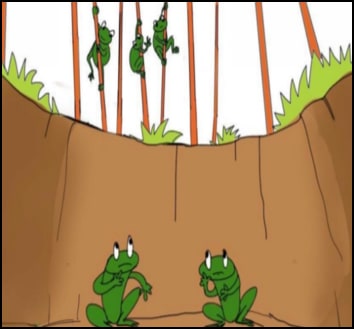A Lesson For the Children – A group of frogs left their swamp and went for a tour of the surroundings. Suddenly, two of them fell into a deep pit. All the other frogs gathered around. From down below, they could hear the cries of those who had fallen down: “Help! Help! Help us get out of this pit!” But those on the outside did not see how they could help their unfortunate friends. The pit was very deep, and as is well known, frogs are not experts at climbing rope.
The two frogs down below tried to jump as high as they could, in an attempt to get out. They jumped again and again, and they tried to help each other get higher still – but all to no avail. Even when they jumped very high, the top of the pit was much higher than they could reach. When those on the outside saw how deep the pit was, the cried down to the bottom: “We are sorry, but this pit is too deep! There is no way to rescue you.” They sighed, and explained to each other and to the victims who had fallen down that sometimes all is lost, and no matter how sorry they were, there was nothing they could do to change the terrible fateful events. We wish that every problem had a solution, they said, but in this case the tragedy has already happened. The two frogs fell down, and they will end their lives at the bottom, in misery, without water, food, or companions.
However, the two frogs that had fallen down had no desire to give up so easily. They completely ignored the cries and the signals of their friends up above, and they continued trying with all their might to jump out of the pit. And all the time, those who were outside the pit continued to yell down and make signs with their hands and feet that nothing could be done… “You will never get out of there alive,” they said.
After a while of continued vain attempts, one of the frogs started to become tired. It saw the height of the walls, heard the cries of the others, and began to understand that there was no reason to continue the efforts. Its strength was beginning to fade, and it simply gave up. It lay down on the dry bottom of the pit, spread out its legs, and waited for death to come. Hunger left its mark, the huge effort of trying to escape brought despair, and the knowledge that there was no hope anyway beat down on the frog without mercy. Its life drained out, and it died at the bottom of the pit.
But the second frog simply did not give up. It kept trying with all its might to jump higher and higher. It knew that the greatest strength of a frog is in its legs, and it kept trying to jump as long as its strength remained. All the while, the frogs at the top continued motioning and yelling: “There is no point in trying… There is no way that you can succeed… Look what happened to the other poor frog…” But this frog would not listen. It kept trying, getting higher and higher all the time. And in the end, somehow the impossible happened. It seems that every living creature has some deeply hidden inner strength which is revealed in moments of great need, and this great power appeared at just the right moment. The second frog jumped to a fantastic and unbelievable height – and succeeded! It jumped so high that it reached the top of the pit, and crawled out!
When the frog came out of the pit, all the others crowded around in amazement and asked: “How did you do it? That pit is very deep…” Using sign language, the frog explained to the others that it was deaf. It could not hear what the other frogs shouted, and it thought that all of their excited signals were meant as encouragement. The grateful frog thanked them for their support, implying that this encouragement is what gave it the strength to accomplish the impossible and set a new record for jumping…
Just look at the power of despair and the power of encouragement.
Email yikhat1@smile.net.il with reactions and suggestions for stories. Reprinted with permission from Zomet Institute (www.zomet.org.il). Translated from the Hebrew by Moshe Goldberg. To subscribe to receive the complete version of Shabbat BeShabbato please write to dan@zomet.org.
The words of this author reflect his/her own opinions and do not necessarily represent the official position of the Orthodox Union.
